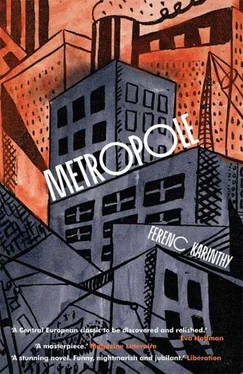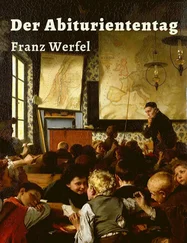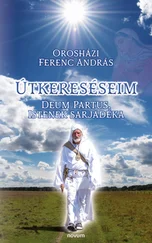Nothing had changed in his room since he left it except he had fresh sheets, new towels, a new bedspread and a different oilcloth on the table. They must do these things weekly. Budai looked down on the street at the inexhaustible flow of traffic. The conference in Helsinki would have been long over by now, the delegates departed each to his or her own home: even the most distant of them would have arrived… He took off his clothes, drew the curtains and lay down on the bed, drawing the covers over him. Within a minute he felt his body stiffen, his torso and limbs grow numb as if he had been hypnotised. He was incapable of getting up again or even turning over. He could not move at all. Nor did he want to: all he wanted was to lie absolutely still, his eyes closed for as long as possible, not to rise even to get a drink of water; he simply wanted to lie there without moving a muscle, not thinking, for hours or even days, for ever.
If he counted from the day he left home it would have been the fourth, fifth, or at the latest, sixth day and they would have expected him back by now; in any case he should have been there a good while ago. What might they have been thinking when he hadn’t written, phoned, sent a telegram or given any sign of his being alive? At what point would they have started to look for him, and where? In Helsinki? There they would quickly have been informed by the committee of his absence from the conference, that they had waited in vain for him to turn up. At the airline, at the transit points, working their way through the various possible airports he might inadvertently have found himself at? Where would they have turned, how would they have gone about it? In an increasing panic? Where in the world might he have disappeared to in such mysterious fashion? What would they put it down to, his relatives, his friends, his colleagues, and, above all, his wife? How would she explain it, what must she be feeling? And his small son? And his dog?… By now all this was causing him actual physical pain, imagining their astonishment, their anxiety, their puzzlement, their ever more despairing attempts to locate him, their horrible suspicions that he might have met with an accident, imagining his helplessness: it was intolerable, their situation was a hundred times worse than his. He had to dismiss these thought or chase them away whenever they assailed him.
He couldn’t tell how long he lay in bed: two or three nights might have passed like this. In all that time no one appeared, called or knocked on his door, at least he did not hear anyone. They didn’t even come to clean the room. He woke suddenly to find it was morning again, the dirty grey light filtering in through the window, as overcast, as leaden and melancholy as before. Since he had arrived here there had been only an hour or two of sunshine. He roused himself, went into the bathroom, took a shower and shaved. He took another brief glance at the bill he had stuffed into his pocket: as far as he could make out the details, they consisted entirely of numbers, not letters. If only he could only work out which group of signs corresponded to which numbers! Once he knew that much he could try to learn — provided he got the right kind of question and could actually ask it — the sounds of the various numbers, and so, step by step, he might eventually be able to decipher the writing too, and then the language, though all this would of course take some time. And that was only provided he had a text in which the numbers, one way or another, were actually written down in letter form. The trouble was these forms had nothing like that… Recognising this he put the bill away for now along with the various related questions to deal with later.
He had more important, more serious matters on his mind now and he decided to do most of his thinking in the room, leaving it only to eat in the familiar buffet, or, to save money, to buy food of the possibly cheaper sort in the shops; some bread, ham, cucumbers and so forth. He didn’t actually have much of an appetite, not even after days of doing nothing physical, all his energy being absorbed by intense mental activity. He hadn’t yet lost all confidence in logical thought: if he could only force his mind to review everything that had happened to him from the first minute of stepping off the plane when the bus brought him into town, something would reveal itself. A total would appear at the bottom of the column of figures. He sat at the writing desk, drawing and scribbling as he used to do back home when faced with a difficult and complex question in linguistics, shuffling tiny slips of paper bearing the various phonemes he had jotted down here and there, grouping and regrouping them, playing with them until, sooner or later, they suddenly appeared in a clear and logical order. That was if they fitted in the first place… He had a certain trust in his ingenuity, in his quick and nimble mind, in the way he could delve into the heart of complex matters, in the vital role of inspiration even in scientific enquiry and maybe in luck too which, so far in his career, had always seemed to be on his side, so that when he began something he generally finished it. He was accustomed to thinking systematically: that was his craft, his vocation, his living. He felt exhilarated as he drew various diagrams and scribbled bits of shorthand in his notebook. Even now he was enjoying this instinctive mark making — it was almost a pleasure working on a logical problem that meant pitting his solitary wits against the city’s million and more secrets. He just needed to make an inventory of all his experiences, to feed the accumulated data into his mind as he might into a computer, and he would simply have to wait for it to come up with an answer.
The most important conclusion he came to was that, however painful, however bitter the process, there was nothing for it but to discover precisely where he was, for until he did so there would be no going home. There was no getting round this order of events or trying to change the relationship between them, since one followed from the other. He could wait for ever for chance to intervene on his side: all ad hoc attempts to escape had proved unsuccessful so far and there was no guarantee that they would prove more successful in the future. He was persuaded that whatever shore fate had abandoned him on he would not easily get away.
It was not that his leaving was not a matter of urgency, but perhaps the very fact that he was in too great a hurry was a problem: he had been in such a rush to escape that he had quite neglected to discover whether this place was on the map at all or if he was the first of his kind to arrive here. Because if he was the first he should not be in quite such a hurry: the explorer in him should commit himself to make basic notes and observations. He should determine the location of the city, the name of the country and continent, find out who lived here and what language they spoke, so that he might return home fully informed about everything.
Was he on planet earth at all or in some other part of the cosmos? In an age of space exploration and science fiction the question did not seem utterly ridiculous. But no, let us keep a cool head about this, it must be earth really. Many signs pointed to the fact: the plants he had noted in the parks and public spaces were certainly terrestrial trees, grass, flowers, as was the limited range of animals he had so far encountered, dogs, cats, doves, sparrows, insects and those angora rabbits in the hotel room he had walked into. Then there were the fish on the market stalls, the canaries, the parrots, and the tortoises in the livestock market, though there was a six-footed lizard too of a kind he hadn’t seen before. The air tasted and felt much the same as it did at home. And above all, most obviously, there were the people, people in unprecedented numbers, in buildings, in streets, in the hotel, in traffic, in vehicles, on the metro, as dense a throng of people, or pretty near as dense, as you would find in any other great city. And apart from this there was an entire recognisable way of life, the whole rhythm of it, the shops, the cafés, the food, the circulation of money, the way they cashed his cheque, the Arabic numerals and the use of the decimal system. Not to mention the week being divided into seven days, the Sunday holiday. And, and…
Читать дальше












